Sometimes I have these feelings. The feelings are that I should have done more with my life. That I could have done more with my life. And yes, I say these things as if it’s all too late for me now. My time is over and it’s time to step aside for the next generation.
Of course that’s not true but it’s easy to be intimidated by the rare individuals that currently fall in the under 40 category who are paving the way for a great future – not just for themselves but for the world we all live in.
Recently, I introduced you to the Rare Under 40 Awards, an inaugural program recognizing 24 of the rarest individuals out there as nominated by their peers and the readers of Rare.us. While there were several that caught my eye, I’ll admit to skimming through some of the honorees. But knowing that I’d be attending the Rare Under 40 Awards in person in Washington, DC had me digging a little deeper. And the event is something I won’t soon forget.
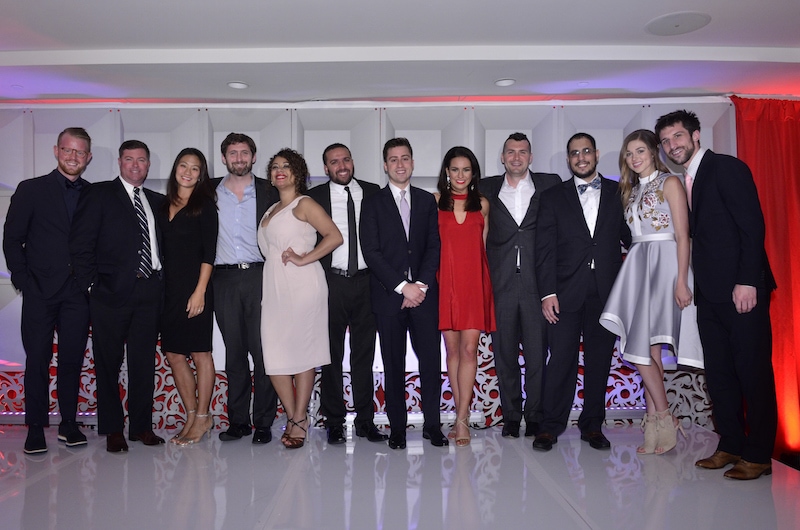
WASHINGTON, DC – APRIL 16: George McGraw, Seth Jordan, Diana Kim; Phil Klay; Marah Lidey, Wesley Lowery, Alberto Altamirano, Alexandra Curtis, Vincent Harris, Mohammed Shaker, Sadie Robertson, and Mason Wartman attend the inaugural DC RARE Under 40 Awards at Hotel Palomar on April 16, 2016 in Washington, DC. (Photo by Kris Connor/Getty Images for Rare)
On Saturday, April 16th, I headed to the Kimpton Palomar Hotel on P Street. An early arrival meant plenty of time to get oriented, give you a glimpse behind the scenes, and get ready for my five big red carpet interviews.
Rare Under 40: Wesley Lowery
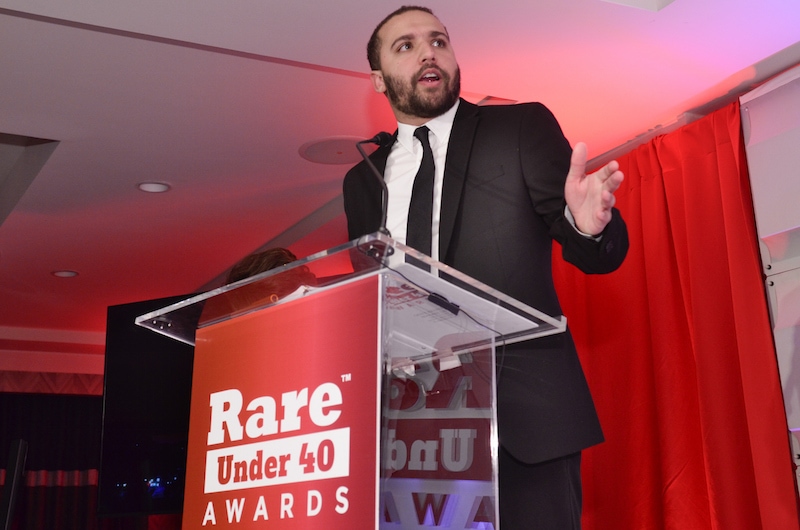
WASHINGTON, DC – APRIL 16: Wesley Lowery attends the inaugural DC RARE Under 40 Awards at Hotel Palomar on April 16, 2016 in Washington, DC. (Photo by Kris Connor/Getty Images for Rare)
If there was anyone I felt super nervous to me, it was Washington Post reporter Wesley Lowery who came to light for his coverage of the Ferguson, MO racial issues. And, of course, he was my first interviewee.
Fadra: You were part of the beat covering Congress and now you cover current events and, dare I say, race relations. Tell me about it.
Wesley: I’m on a national desk doing national breaking news, including issues of racial injustice and policing, broadly. And for the past year, we’ve been working on a project on police shootings nationally, trying to track them and do analysis of them.
Fadra: I read that you’re really a truth seeker and I think that what journalism comes down to, right?
Wesley: That’s what journalism should be. I think it too often it isn’t. I think it’s difficult right now partly because there are so many media outlets and journalists cutting in different directions. Some of us have different ethics, different motivations, different agendas and I think it’s important to to be able to call a spade a spade. Sometimes we’re so worried about offending that we go out of our way to not tell the truth. We look to the media to tell us what’s going and what things mean and that’s what I seek to do.
Fadra: You’re African-American. How does that or does that affect the way you cover high-profile racial stories?
Wesley: Most of mainstream media is white. Because of that, there can sometimes be a dehumanization of the black experience or black reality. When I look at someone like Michael Brown in Ferguson, for example, I see someone who could have been my younger brother’s best friend, who could have been in my basement playing video games. That creates a different level of humanity when I seek to tell these stories because I see them as human and these are the types of people I interact with.
That doesn’t mean we go out of our way to be sympathetic towards them but rather it means I see them as human, not just another name in the news. Too often, we force people into these black and white binaries – the hero or the villain, the good guy or the bad guy. That’s not really how this works.
Fadra: Let’s end on a fun note. Tell me your favorite movie.
Wesley: I really like Seven with Morgan Freeman and Brad Pitt. I like scary movies and psychological thrillers. That’s definitely up there on the list.
Read more about Wesley’s story here.
Rare Under 40: Allie Curtis
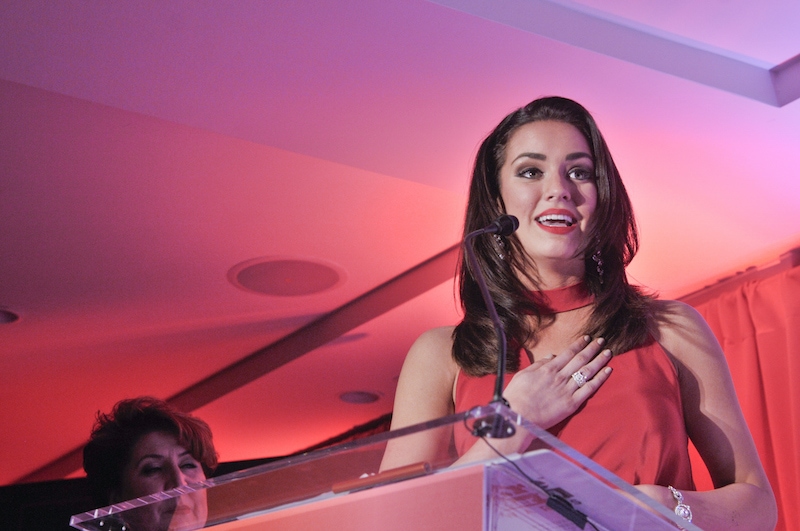
WASHINGTON, DC – APRIL 16: Alexandra Curtis attends the inaugural DC RARE Under 40 Awards at Hotel Palomar on April 16, 2016 in Washington, DC. (Photo by Kris Connor/Getty Images for Rare)
Fun fact: when I was growing up, I was obsessed with beauty pageants. I used to dream of becoming Miss USA but only because I knew I didn’t have the talent for the Miss America pageant. Allie Curtis does. As the reigning Miss Rhode Island, she sings but more importantly, she has her sights set on encouraging women to play an important role in politics.
Fadra: I was looking for your crown! What is the etiquette with wearing crowns?
Allie: Well, I usually travel with it but I didn’t bring it with me. I wouldn’t be wearing it tonight because there’s an open bar! I wear it most of the time for events but I think this event is celebrating so much more than just Miss Rhode Island. It’s about the work that I’m doing now and that I’ll continue to do post-crown.
(At this point I stopped to admire her Miss America ring and the sparkly earrings she was wearing – also worn for the Miss America pageant!)
Fadra: Let’s talk about your future: short term and long term goals.
Allie: As soon as I’m done with Brown University (where she’s getting ready to receive her master’s degree in Public Policy), I’m going up to Vermont to manage the campaign for Caroline Bright – she’s 25 years old and running for State Representative. And she’s a former Miss Vermont! I’m also working on second master’s degree in Homeland Security back in Rhode Island.
Fadra: What do you see doing longer term with a degree like that? Moving to DC?
Allie: Running for Congress! I’d love to be on the Homeland Security committee for the House. That’s a goal I see maybe a decade out but I see myself doing that in some capacity.
Fadra: Do you really think the lack of women in political roles comes down to exposing them to other women in the political arena?
Allie: Absolutely. I think there are a lot of women who think if so.. maybe.. what if… They think they could pursue this but there are so many different barriers along the way. I just never really saw those barriers for myself until I pursued a position on campus.
Fadra: How has being part of a scholarship pageant like Miss Rhode Island helped elevate you going forward?
Allie: First of all, I talk about gender barriers that there are for women in politics. And with regards to pageants, you need to have women who are pursuing what’s in their hearts regardless of external factors. It’s not about objectification if you, as a women, feel empowered by it. Secondly, it’s been extraordinary for leadership training and it’s taught me how to fundraise. I’ve gotten very comfortable asking for money for myself which is a huge barrier for women in general.
Fadra: I know you sang “Poor Unfortunate Souls” from The Little Mermaid for your talent competition. I’m a huge movie fan. Tell me what your favorite movie is.
Allie: I have to say Mrs. Doubtfire. I grew up in San Francisco for quite a bit so it hit close to home. But I always thought it was so funny and to this day I laugh as hard as I did when I saw it in first grade for the first time.
Read more about Allie’s story here.
Rare Under 40: Alberto Altamirano
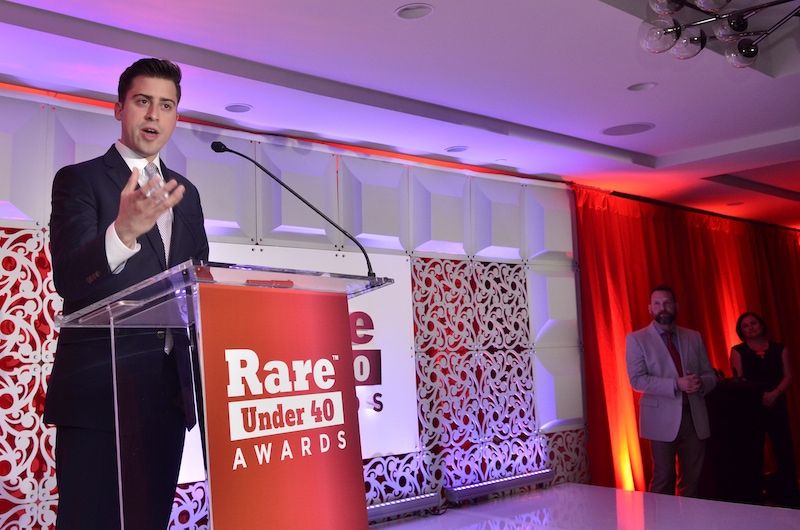
WASHINGTON, DC – APRIL 16: Alberto Altamirano attends the inaugural DC RARE Under 40 Awards at Hotel Palomar on April 16, 2016 in Washington, DC. (Photo by Kris Connor/Getty Images for Rare)
Beto, as he prefers to be called, arrived with his mother and spent time talking about life in Texas, his infrastructure app that hopes to unite communities in the U.S. and Mexico, and his thoughts on politics. And I only put my foot in my mouth once.
Fadra: So, Beto, tell me where you’re originally from.
Beto: I’m originally from McAllen, TX, a border town. I grew up there and spent the last seven years in Austin and now live in San Antonio.
Fadra: Oh, Austin is a big town for technology and innovation!
Beto: Austin and San Antonio – it’s happening! A lot of people are moving from California and other parts of the country to Central Texas. I feel like there’s a big movement when it comes to technology. As we move forward, technology is going to play an important role in our lives and if we don’t embrace technology, how can we expect to move forward and achieve progress as a city, as an urban landscape, and as a country?
We switched gears to talk about his app, CityFlag, that allows users to report infrastructure related issues in their city and get rewarded for their involvement in the community.
Fadra: I love the idea of your app, CityFlag. Has it been released yet?
Beto: We launched the beta at South by Southwest about a month ago and it was a success. Great feedback and the crowd was excited. The next step is to launch officially with the city. We’re planning to launch with San Antonio and Mexico City.
Fadra: Have you had to prove the value to the cities you’re working with?
Beto: The cities are saying Bring It On! We’re trying to innovate the public sector. Think about the government – many times it’s reactive and not proactive. We’re introducing this platform that’s really like social media for civic engagement. Local governments that we’ve spoken with are excited because it’s something that’s appealing to the younger masses.
Fadra: Mexico City seems like a very ambitious place to launch. It’s the largest city in the world!
Beto: It’s 18 million people in one city! In the next three months, we’ll launch there and San Antonio and from there, we can go anywhere. And we can do that because the app can integrate with any government’s Citizen Relationship Management system.
Fadra: Let’s switch gears and talk politics for a minute. What can the Republican party do to attract support from the Latino community?
Beto: I think the Republican party is innovating and trying to engage millennials. But as with any party, they’re struggling with how to engage both the younger and older generation at once. You have to merge that vision.
Looking at the presidential race, you had two Latinos running under the Republican ticket. Having those last names on the ticket means something. But they need to engage the Latino community with other subjects besides immigration. While immigration is important, the economy is the biggest issue for Latinos. These are issues that are tangible and directly affect the Latino community.
Read more about Beto’s story here.
Rare Under 40: Mohammed Shaker
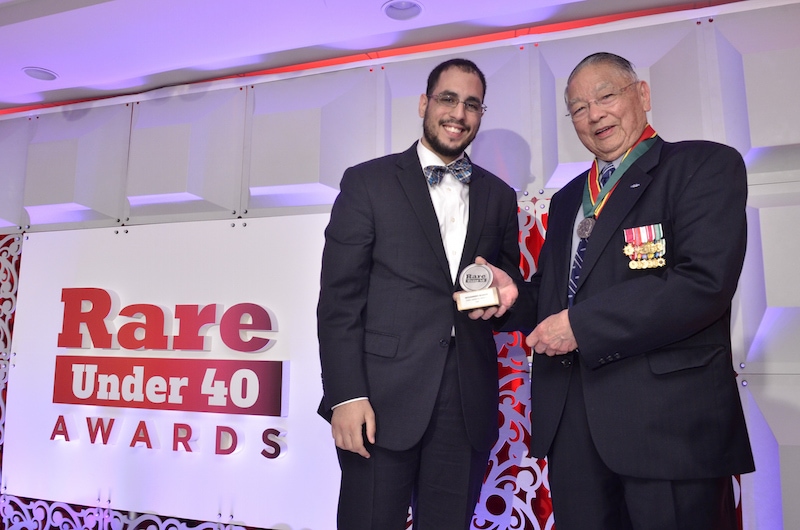
WASHINGTON, DC – APRIL 16: Wade Ishimoto presents an award to Mohammed Shaker during the inaugural DC RARE Under 40 Awards at Hotel Palomar on April 16, 2016 in Washington, DC. (Photo by Kris Connor/Getty Images for Rare)
I couldn’t wait to talk with Mohammed. I loved that he broke all stereotypes: an Arab-American of practicing Muslim faith who served in the U.S. Army (82nd Airborne, to be exact) and is now a leader in the his local Republican party. Needless to say, we had a lot to talk about.
Fadra: Tell me about yourself. (I actually got totally tongue tied here so I had Mohammed tell me a little about his personal history and it was a great way to kick off the conversation.)
Mohammed: I was born in St. Petersburg, FL. My parents didn’t actually intend to stay. We were visiting my uncle and within a year, we went back to Egypt where I grew up for the next seven years, and also spent two of those years in Saudi Arabia. My dad only had a high school diploma so we traveled wherever work was.
My dad actually sat down with me three weeks ago and talked to me about why we came to the United States and it hit my pretty strongly.
Fadra: Was that the first time you’d really had that conversation?
Mohammed: I had always heard reasons but he sat down and told me he saw Egypt was going down a bad path. They were creating a very hostile culture with the government and he didn’t want to be there. Arabs are a very tight knit community and very family-oriented so the fact that my father sacrificed not being around his family and friends back home and brought us here to have a better life, that just says a lot. He was doing it for his children.
Fadra: You spent time in the Army. Did you enlist?
Mohammed: I enlisted behind my parents’ back.
Fadra: I bet that went over well!
Mohammed: My parents weren’t happy. I knew they weren’t going to want me to do it. They saw that I really loved and was almost obsessed with my uncle who was in the Egyptian military. I joined Junior ROTC in high school and ended up asking my mom for a copy of my birth certificate and next thing she knew, I joined the army!
Fadra: How did your service change your perspective on this country?
Mohammed: A lot! I moved here in 2000 and when I was in middle school in 2001, September 11th happened and I started getting bullied a lot. I was worried that’s how the rest of my life was going to be. But it wasn’t the same in the service. I was in the 82nd and I noticed we’re all there doing the same thing. Sitting on an airplane – I’m an Arab Muslim, across from me was a black dude, a Christian dude, a Spanish Jewish guy, and we’re all sitting there with these parachutes about to do something dangerous. None of us hated each other. I thought, this is so beautiful!
Fadra: So the brotherhood overcame any of the diversity issues. Let’s switch gears and talk politics. How did your viewpoint evolve?
Mohammed: On my own, I’ve had a draw toward politics and things that are bigger in the world. My parents are politically active but more with Egyptian politics.
At this point, he stops to tell me his parents voted for George W. Bush and that he is considered the first Muslim President. When he ran in 2000, he did a lot of grassroots work with a lot Muslims. Every major Muslim organization endorsed him and he secured about 75-80% of the American Muslim vote.
Read more about Mohammed’s story here.
Rare Under 40: Orlando Watson
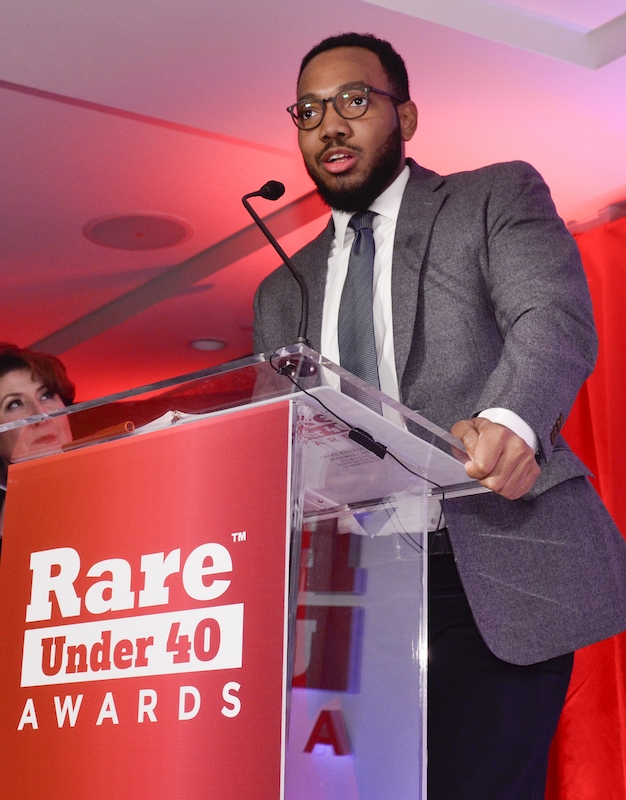
WASHINGTON, DC – APRIL 16: Orlando Watson attends the inaugural DC RARE Under 40 Awards at Hotel Palomar on April 16, 2016 in Washington, DC. (Photo by Kris Connor/Getty Images for Rare)
And finally, I had the chance to meet with Orlando Watson who snuck in right before the dinner started. I didn’t have my interview questions and my recorder didn’t work so instead of a dialogue, I’ll tell you a little more about my impressions of Orlando Watson.
This is a guy who’s going places. At 27 years old, he’s already worked on the campaign for Senator Rand Paul, served as Communications Director for Black Media at the Republican National Committee, and now serves as press secretary for Rep. Paul Gosar, R-Ariz.
When I asked him about how his time in Washington has changed his perspective on politics and the Republican party, I could see his caution in answering. It was clear that change is slower than he’d like but he uses his frustrations to inspire him, not deter him.
We also talked about the obvious – finding ways in which the Republican party can be reach out to minorities in a way that’s meaningful. He said there’s definitely room for more relationship building and that sometimes just being willing to show up and listen is half the battle.
The one question where he did provide a definitive answer was when I asked him what his favorite movie was. Looking to pal Wesley Lowery and his dinner companion, it was clear they were all eager to hear his answer.
“Juice,” he replied. Having grown up in New York City, this 90s movie with Omar Epps and Tupac Shakur was the one that stuck with him.
Read more about Orlando’s story here.
***
It was exhausting to be in the presence of so many inspirational people. Not only did I get up close and personal with these five individuals at the Rare Under 40 Awards, but I got to hear from every honoree in attendance.
It was one of the presenters, though, that seemed to capture the spirit of the evening. Retired U.S. Army Capt. Wade Ishimoto was invited on stage to present the awards to those honorees that had served in the U.S. Military. When his role was over, he stepped forward, asked for moment with the audience, and led us all in the singing of “America, the Beautiful.”
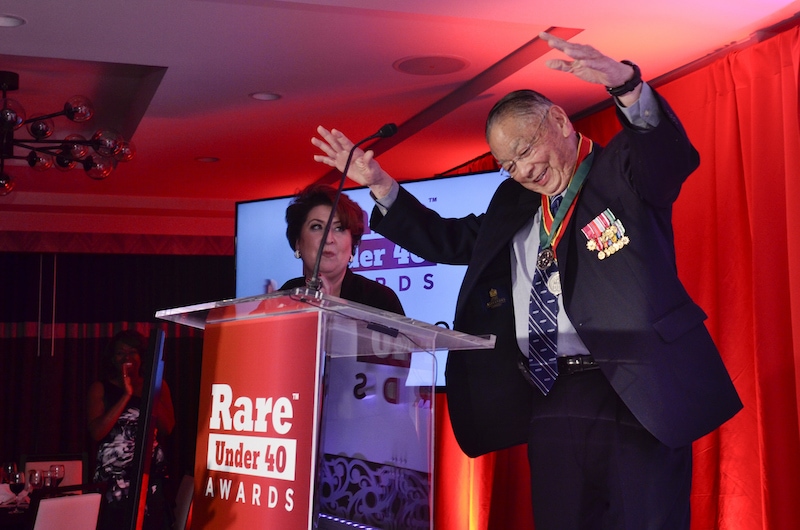
WASHINGTON, DC – APRIL 16: Wade Ishimoto attends the inaugural DC RARE Under 40 Awards at Hotel Palomar on April 16, 2016 in Washington, DC. (Photo by Kris Connor/Getty Images for Rare)
If your eyes haven’t been wet in a while, sitting in a room full of honorable people singing such a patriotic song will definitely bring some tears to your eyes. And as I sat reflecting on the evening and how I’m no longer rare “under 40,” I still have the opportunity to be rare, especially by raising awareness of so many wonderful individuals.
This post is sponsored by Everywhere Agency on behalf of Rare.US; however, all thoughts and opinions are my own.
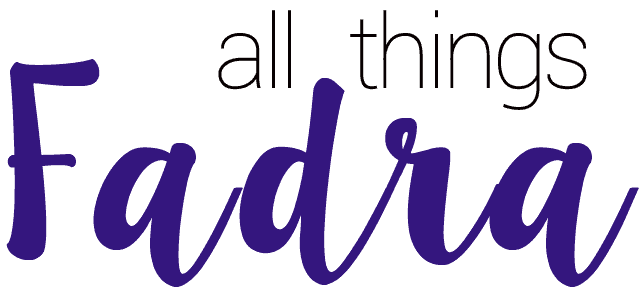
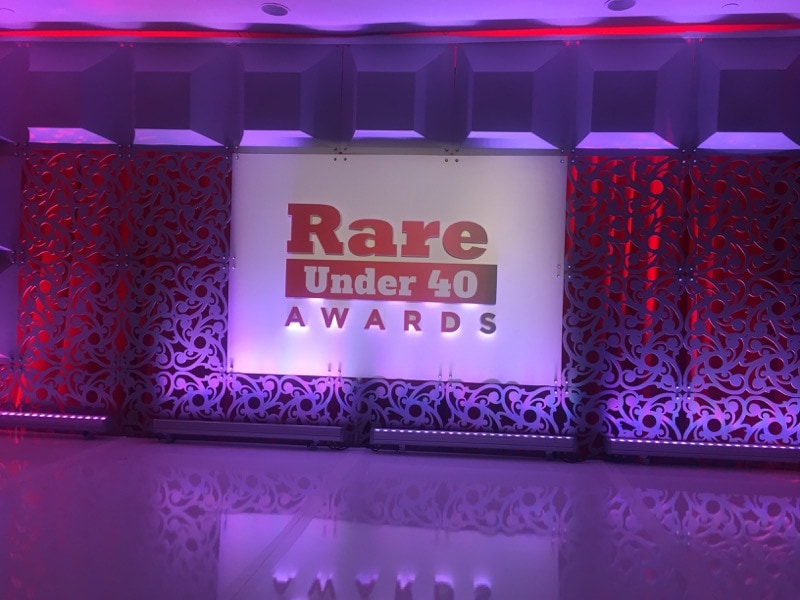
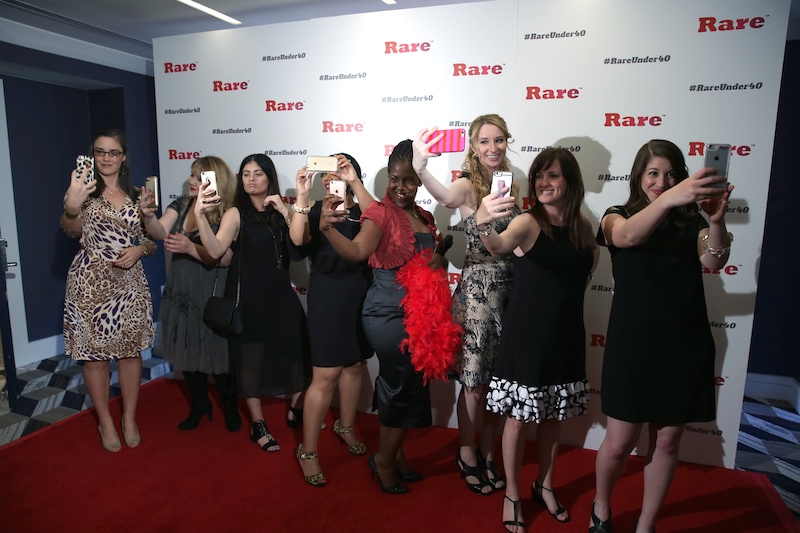
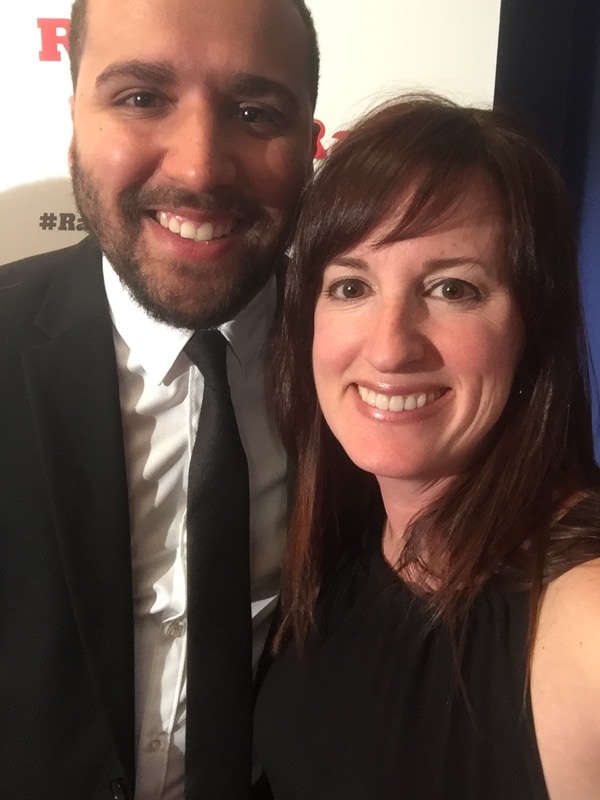
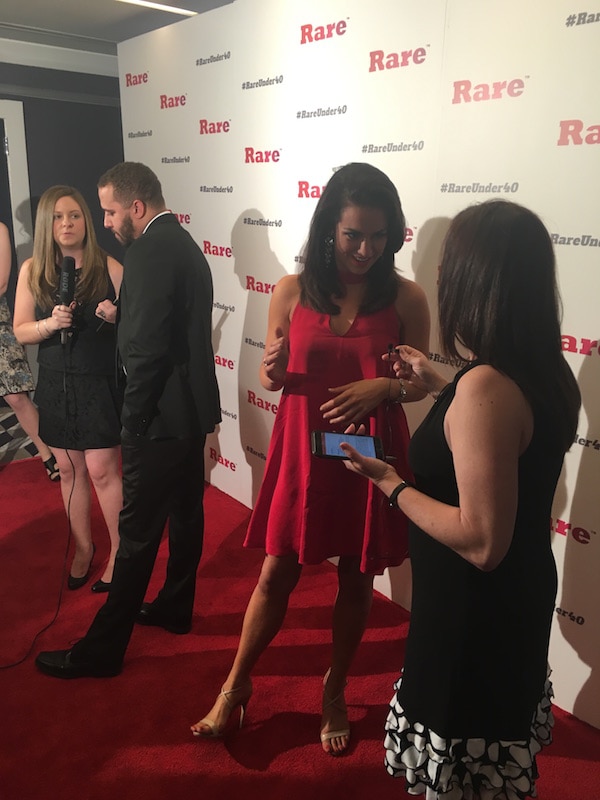
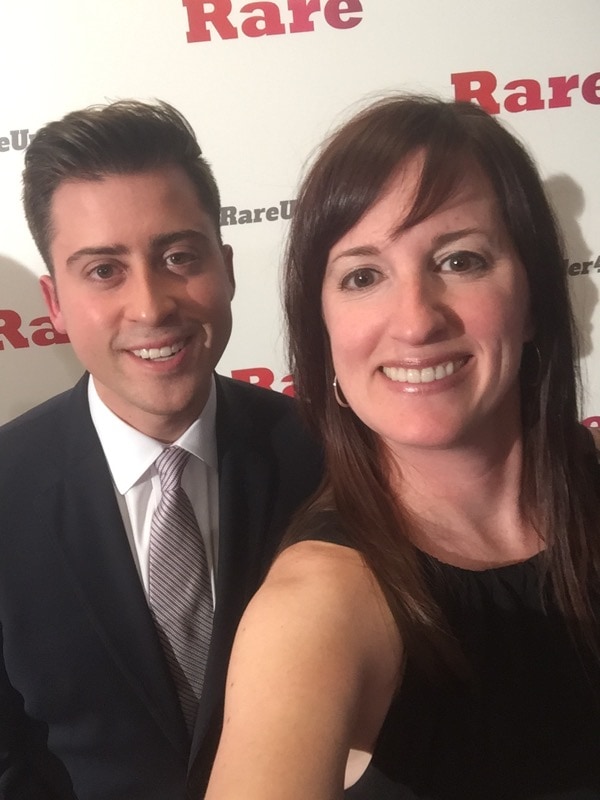

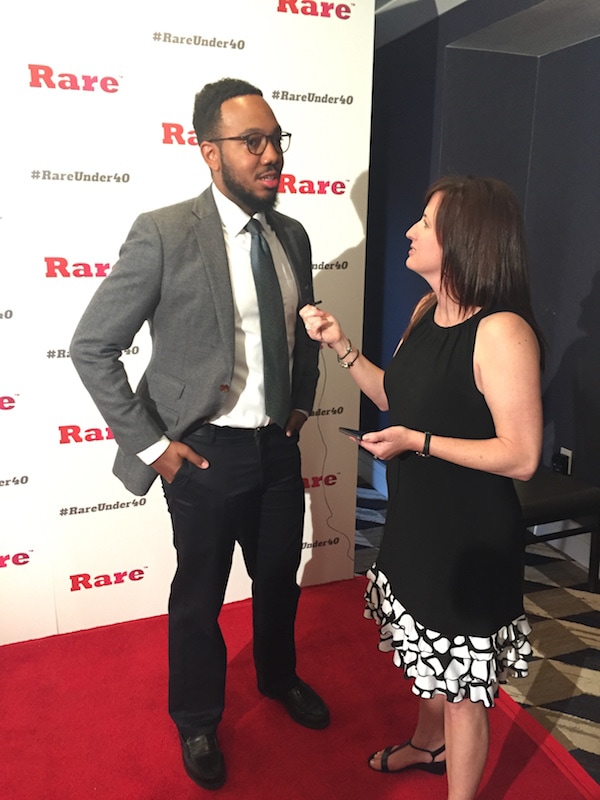
10 comments
What an incredible night! I had fun following along on Twitter and love these interviews. Thanks for sharing!
We’ll have to get you to DC for the next one!
What a fascinating evening that must have been! And how how I wish I was under 40….
What a fascinating evening that must have been! And how how I wish I was under 40….
So inspired by all these young minds! Can’t wait to share this post with my teen daughter!
So inspired by all these young minds! Can’t wait to share this post with my teen daughter!
So inspiring Fadra!!!
So inspiring Fadra!!!
I’ve never heard of these awards, but how much fun! And you rocked the red carpet!
So inspired by all of this!